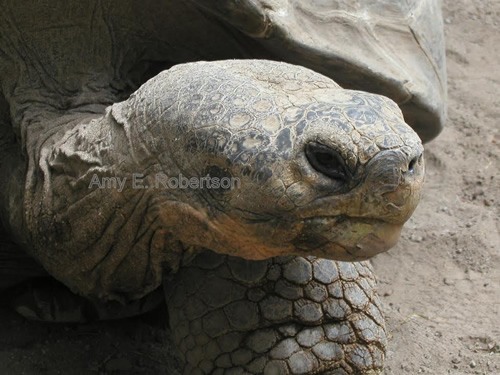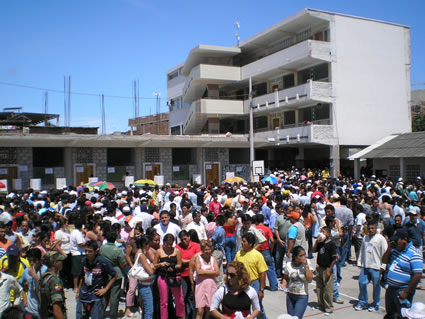How to Find a Worthwhile Voluntourism Experience Abroad
Choose a Great Volunteer Organization or Program
Article and photos by Amy E. Robertson
 |
| Wildlife, like this Galapagos tortoise, is a major draw for tourists and voluntourists alike. ©Amy E. Robertson. |
Given the concerns, some say to “take the volunteer” out of tourism. As the author of a guide to Volunteer Vacations in Latin America, it will come as no surprise that I am firmly in the camp of those who view international volunteering, even short-term, as a worthwhile experience. By volunteering, we have the chance to add our drop to a bucket full of effort. To pull back the curtain and see beyond pretty beaches and historical landmarks. To avoid the voyeurism of “slum tourism” by working shoulder to shoulder with people whose context may be different than our own. To heed the call to bear witness to injustice and inequality. To be global citizens.
Grade school civics teaches us that citizenship comes with both rights and responsibilities. Finding a quality volunteer experience goes beyond thinking about what you want and what you have to offer. It also includes the responsibility to ask for accountability from the volunteer organization. By asking the right questions of hosting organizations, volunteers can better support well-planned, effectively executed initiatives that have a positive impact.
 |
| I had the chance to see Ecuadorans exercising their civic responsibility when I volunteered as an election observer. ©Amy E. Robertson. |
Five Criteria to Consider and Questions to Ask About a Volunteer Organization
1) Need — How did the organization identify the need that its work addresses? Was it identified by the community or by someone from outside? If the latter, on what basis? We often hear the importance of community-driven initiatives, but when it comes to the environment, projects are often driven by actors from outside of the community, and help draw attention to an issue that the community may not have prioritized. In such cases, is community outreach and education part of the overall program?
2) Impact — Ask the organization how they evaluate the impact of their work. Are the evaluations methodical or anecdotal? If only anecdotal, are there plans to do something more? Is there an external report on the impact of the project that could be shared? If your project is of a finite nature (e.g. building a house), is there a follow-up evaluation of impact? You may not be qualified to judge the impact of a development initiative, but you want to make sure that it’s something that the organization is thinking about for themselves.
3) Funding — If you are paying any kind of fee, you have every right to ask for a breakdown of where the money goes. Higher costs don’t mean a bad program - a larger fee might mean more accommodations that are comfortable or more benefits like language classes and excursions, and that might be just what you are looking for. On the other hand, higher fees might help fund tangible items like a smokeless stove or solar panels that you’re coming to install. It takes time and effort to manage volunteers, and if part of your cost is an administration fee to cover that, it’s a legitimate expense. Nevertheless, by asking around at different organizations how much of a program cost goes toward an “administrative fee,” you will get a sense of how much is reasonable. A hesitancy to reveal where your money goes is a red flag.
4) Fit — There are organizations that offer volunteer experiences requiring as little as a few hours of your time. What matters more than the amount of time volunteered is how that effort fits into the organization’s overall program. In a couple of hours it’s possible to lead a music workshop at a youth center, or serve lunch at a soup kitchen. Two nights of monitoring turtles can be a valuable part of turtle protection when it is part of a well-organized, ongoing program. If your assignment is teaching English, ask for details about the students, their levels and where they are in the curriculum. If the organization can’t offer straight answers, then it is hard to imagine that you will be able to effectively prepare and teach in a short-term timeframe. On the other hand, depending on the students’ English skills and the program design, the chance to spend even an afternoon with a native speaker who reads a story aloud or engages them in a conversation might be just the practice the students need. A bucket can be filled one drop at a time, and short-term experiences that form part of a well-planned program can add up to a valuable impact.
5) Special Considerations when Working with Children — Will you be alone with children? If so, under what circumstances, and does the organization require a background check? Standards of child protection vary, so ask what they are before you sign up. If your trip is organized by a voluntourism company, seek to learn about the local partner on the ground from someone in addition to your sending organization, and check experiences with former volunteers. If the organization’s policies are lax, demonstrate your own commitment to child protection by finding somewhere else to volunteer. The volountourism debate is perhaps fiercest over working in orphanages, and it is critical to be careful if this type of work appeals to you. There are places around the world where parents are increasingly abandoning children to orphanages in the hopes of giving their children a better life. Is there a way you can volunteer that will help support the structures that enable children to stay with their parents instead? (e.g. job-skills training, daycare provision, etc.)
* * *
Life isn’t perfect, and your volunteer organization won’t be either. But good intentions don’t suffice. If you are interested in being a volunteer, take on the responsibility of looking for an organization with a demonstrated positive impact. Ask questions. Get informed.
Call it voluntourist, call it being a global citizen. The names don’t matter. Your actions do.
Connecting to the Voluntourism Debate
Don’t stop here! Check out the many aspects to issues related to volunteering with the following resources:
Can Voluntourism Make a Difference? Opinion debate hosted by New York Times.
Questions to ask yourself before volunteering can be found at LearningService.info and its classic new book. |

|
Amy E. Robertson has written many articles for TransitionsAbroad.com as Connected Traveler Contributing Editor.
She is the author of numerous publications for Moon Handbooks. Her writing has been published on NPR, Vice MUNCHIES, Budget Travel, Delta Sky, National Geographic Traveler, Wall Street Journal, Christian Science Monitor and Travel + Leisure, among others.
Amy has lived in six countries and traveled in more than 60.
Her volunteer experiences include building houses in Washington State and Honduras, monitoring presidential elections in Ecuador, working with youth on social documentaries in Bolivia, and serving lunch at soup kitchens in Seattle and Beirut.
Amy has a background in international development and nonprofit management and has worked in both the private and nonprofit sectors.
|
|
